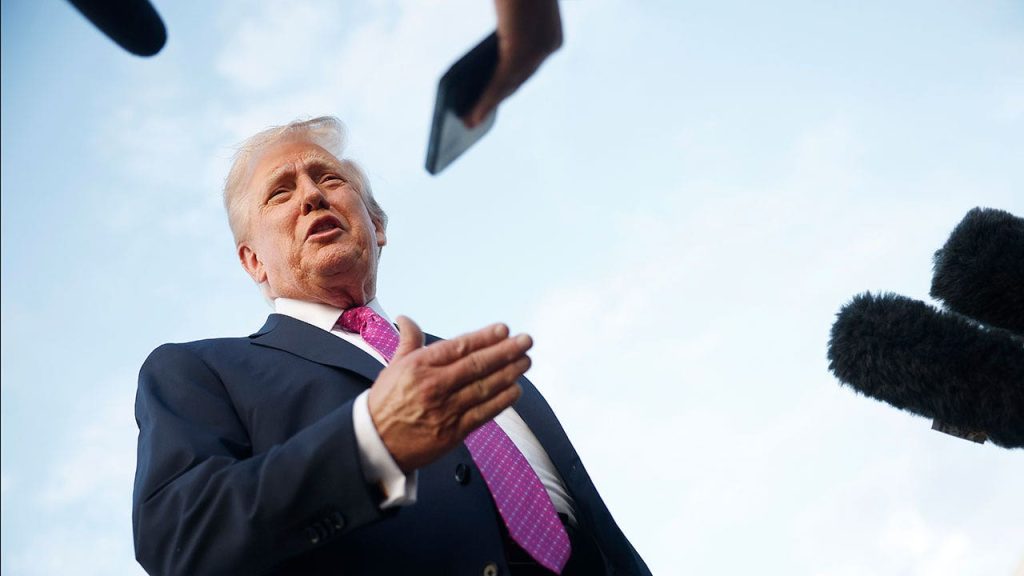Trump Calls on Europe to End Russian Energy Purchases as He Considers New Sanctions
In a firm stance against Russia’s ongoing war in Ukraine, President Donald Trump has intensified his demands for European nations to completely cease all energy purchases from Russia. Speaking to reporters on Sunday evening, Trump expressed frustration with NATO allies, suggesting they aren’t doing enough to counter Russian aggression despite the European Union’s recent sanctions. “They’re not doing the job. NATO has to get together. Europe has to get together,” Trump stated plainly. He emphasized that while European nations are his friends, their continued purchase of Russian oil creates an imbalance in the global response to Russia’s actions. “We can’t be expected to be the only ones that are full bore,” he added, making it clear that he expects a more unified approach from Western allies.
The President’s comments reflect growing impatience with what he perceives as inadequate measures from Europe. While he acknowledged his willingness to implement sanctions against Russia, Trump insisted that European nations must strengthen their own sanctions to match America’s commitment. “I’m willing to do sanctions, but they’re going to have to toughen up their sanctions commensurate with what I’m doing,” he confirmed. This statement followed a letter he sent to NATO just a day earlier, where he declared his readiness to implement “major sanctions on Russia” but only when “all NATO Nations have agreed, and started, to do the same thing, and when all NATO nations stop buying oil from Russia.” His position represents a significant shift in pressure tactics against both Russia and America’s European allies.
The reality of Europe’s energy relationship with Russia presents a complex challenge to Trump’s demands. While European nations have substantially reduced their dependence on Russian energy since Putin’s February 2022 invasion of Ukraine, they haven’t completely severed these ties. Countries like Hungary, Slovakia, France, Belgium, and Spain continue to be top importers of Russian energy. Hungary, notably maintaining friendly relations with Putin despite its NATO membership, leads European nations in Russian crude oil and pipeline gas imports. France follows as the second-largest purchaser, continuing to import liquefied natural gas (LNG) that has largely avoided EU sanctions due to long-standing legal commitments extending into the early 2030s. These “take-or-pay” contracts would subject France to penalties or arbitration if broken, highlighting the practical difficulties in immediately cutting all Russian energy imports.
The financial scale of this ongoing energy relationship is substantial. According to the EU’s Data Protection Authority, the bloc imported nearly $5.2 billion worth of Russian LNG in the first half of 2025 alone. When questioned about his plans for additional U.S. sanctions against Russia, Trump suggested Europe might need to halt all LNG imports as well. “The deal is, they’re not supposed – whether it’s natural gas or whether it’s cigarettes, I don’t care – they’re not supposed to be buying from Russia,” the President stated, though he didn’t specify which agreement he was referring to. Interestingly, Trump didn’t address America’s own $2.1 billion worth of Russian imports in the first five months of 2025, which primarily consist of enriched uranium, palladium, and fertilizers – products that have remained outside the scope of previous sanctions.
Trump’s strategy extends beyond pressuring European allies to cut Russian energy ties. He has also called for NATO members to impose significant tariffs on China, ranging from 50% to 100%, which he suggested would only be withdrawn after the war in Ukraine concludes. This proposed rate exceeds the current 30% tariffs Washington has placed on Beijing, though it aligns with Trump’s recent threats to increase Chinese tariffs to as high as 200%. This approach indicates a broader strategy of using economic pressure against not only Russia but also China, which has been accused of providing support to Moscow during the conflict, to potentially force a resolution to the Ukraine war.
The President’s demands reflect his administration’s emerging approach to the Russia-Ukraine conflict – one that seeks to spread the economic burden of confronting Russia more evenly across the NATO alliance. By focusing on European energy purchases from Russia, Trump is highlighting what he sees as a fundamental contradiction: NATO allies condemning Russian aggression while simultaneously funding the Russian economy through energy purchases. This stance puts European nations in a difficult position as they balance security commitments, economic realities, and their own energy needs. As the situation develops, the question remains whether Trump’s pressure tactics will succeed in creating a truly unified Western response to Russia’s actions in Ukraine, or whether practical constraints and diverging national interests will continue to complicate efforts to isolate Moscow economically.


